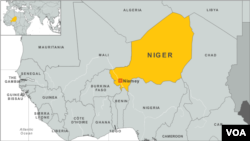After more than four years of detention in the Sahel, the 63-year-old German humanitarian Jörg Lange has been released, the NGO for which he worked, Help, announced on Saturday.
"We are very relieved and grateful that our colleague Jörg Lange, after more than four and a half years, can return to his family," Help's managing director, Bianca Kaltschmitt, wrote in a statement.
According to the weekly Der Spiegel, relying on "security sources," Lange "is doing well, given the circumstances." He would have been repatriated to Germany on board an army plane, adds Der Spiegel.
Asked by AFP, the German government declined to comment.
It is thanks to the Moroccan intelligence services and their contacts with jihadist groups in the Sahel, according to Der Spiegel, that this release could take place.
The NGO "heartily thanks all those who have contributed to this release or who have supported it, in particular the crisis unit of the Ministry of Foreign Affairs, the criminal police, as well as the authorities and friends in Mali, Niger and in neighboring countries.”
Lange was kidnapped on April 11, 2018, in western Niger by armed men on motorcycles near Ayorou, in a border region of Mali plagued by recurrent jihadist attacks. His Nigerian driver was released shortly afterwards.
According to the German press, Lange was sold after his kidnapping to the jihadist group "Islamic State in the Greater Sahara" (EIGS).
These kidnappers had demanded a seven-figure ransom and sent several videos of the humanitarian, in which he called on the German government not to drag out the negotiations.
According to Der Spiegel, Berlin had considered having him released by an elite unit of the Bundeswehr, the KSK special forces, but had given up on it because of the risks of such an operation.
At least four Western hostages are still being held in the Sahel, according to a count covering only the cases made public by their entourage or their government: Frenchman Olivier Dubois, kidnapped on May 5, 2021, American Jeffery Woodke (October 14, 2016), Australian Arthur Kenneth Elliott (January 15, 2016) and Romanian Iulian Ghergut (April 4, 2015).
Another German, Father Hans-Joachim Lohre, who has not been heard from since late November, is widely believed to have been abducted, although no claims have been reported.
This Catholic priest was to celebrate Mass in a district of Bamako but had disappeared in the evening, a probable kidnapping of an exceptional nature in the Malian capital.
Jihadist violence in the Sahel began in 2012 in Mali, killing thousands and displacing millions. They have spread to neighboring Burkina Faso and Niger and now threaten the states of the Gulf of Guinea.
This serious security crisis leads to violence of all kinds, of which kidnappings are one aspect, whether of foreigners or locals. The motivations, ideological or villainous, range from the demand for ransom to the act of reprisals through the will to bargain.
France completed in August the withdrawal of its troops who had been operating in Mali for almost 10 years. But Paris, which still deploys some 3,000 soldiers in the Sahel, has given itself six months to finalize its new strategy in Africa.




